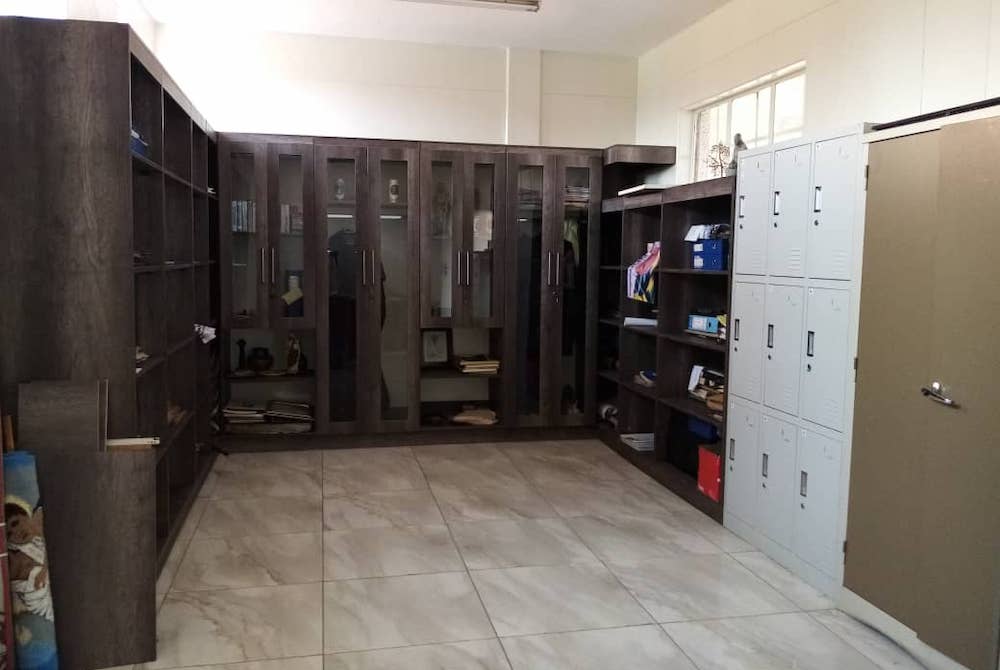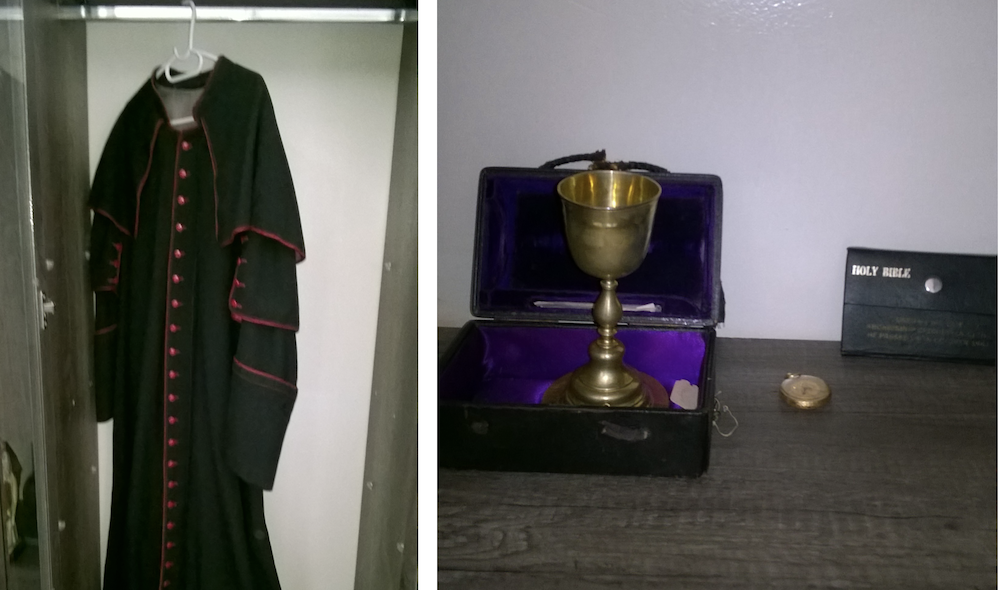
The archives storage area for the Little Children of the Blessed Lady congregation is a renovated sewing room at the Harare, Zimbabwe, motherhouse but lacks climate control. (Helena Jonasi)
When I became secretary general for my congregation, the Little Children of the Blessed Lady (LCBL) in Zimbabwe, I realized the need for archives. I like history and particularly the history of our congregation. Founded in 1932 by Archbishop Aston Ignatius Chichester, a Jesuit, we were the first of other local congregations. His idea to invite African girls to religious life was thought to be foolish and doomed to failure by most Europeans and government officials. Admittedly, it was a challenging task, introducing a mode of life completely different from anything imagined by young African women and their parents, but he persevered and so we have our 198 sisters living in 46 houses in four dioceses of Zimbabwe.
My parents and family lived in Harare. They were Christian and encouraged my sisters and me to join a small Christian community for weekly prayer. They also sent me to St. Peter's, a Catholic primary school. I felt called to religious life at a very early age, inspired by the commitment and discipline of my primary school principal, Sr. Linus Mandeya, a member of the Little Children of the Blessed Lady, and my secondary school principal, Dominican Sr. Concilia Renner. At school, I belonged to the Christian Life Group that supported a Christian way of life.
When I joined the Little Children of the Blessed Lady, I was sent to St. Dominic's secondary school, after which I joined the formation program, was educated as a nurse, and spent 25 years in remote mission hospitals. Being in remote areas, I made sure I had plenty of books to read — my favorite hobby. And even now, I never travel without a book.
I never dreamed I would be appointed secretary general for my congregation five years ago. Fortunately, an opportunity to attend a course with the African Sisters Education Collaborative, and the Sisters Leadership Development Initiative came at the right time. There, I learned to be organized, and I took computer classes where I learned to save documents, to scan and store documents — just what I needed for my work. My love of reading also developed skills that proved helpful in my responsibilities, one of which is organizing our congregational newsletter. However, the greatest challenge for this task has been finding needed, accessible information. Our congregational information was and still is, scattered in the 46 local communities throughout the country, and we did not have any central safe place at our generalate to store documents that were dispersed.
Advertisement
The idea of archives had been discussed at one of our general chapters, but not yet acted on. That discussion had inspired me then, but another motivation was from two of our sisters, Basilia Dembetembe and Bernadette Tariro Kuvheya, who had been compiling the history of our congregation. Because I had no formal training in archival work, I decided to visit the archives of the Harare Archdiocese. Dominican Sr. Veronica Traquino showed me how the archdiocesan records are kept. On a later visit to Malawi, Sr. Rita Mulenga, a Holy Rosary Sister who works at the Lilongwe Archdiocese, gave me a tour of that archive. The most important thing I learned from these visits was what our generalate did not have: proper storage, collected data, digitized information and a good filing system. I took this information to my superior general, Sr. Illumina Katsukunya, who then encouraged me to organize a congregational archive the best I could.
I applied for and received funding from the Jesuit Missions to renovate an old sewing room into a new archive and then began to collect and compile information from the dispersed communities. Filing is challenging because it demands categorizing and organizing, but it is in process as we scan and create new folders. One of my most joyful days was when I was able to put the cassock, chalice and prayer book of Archbishop Chichester into the archive. Along with the writings and mementos of our founder, we also keep photo albums, banners and all sorts of mementos from special congregational celebrations.

One of my most joyful days was when I was able to put the cassock, chalice and prayer book of Archbishop Aston Ignatius Chichester, founder of the Little Children of the Blessed Lady congregation, into the archive. (Helena Jonasi)
We have files about the administration of the congregation, items like minutes, contracts, appointments of sisters, finance reports, and correspondence from other congregations and stakeholders. Profiles of all of our sisters, anniversaries, celebrations, special occasions and community reports are being collected and filed, too.
We have come a long way in these five years, and the process continues, but because of COVID-19, travel to communities is limited, not only in Zimbabwe, but to former places where our sisters served — Mozambique for 20 years and Zambia for several years. Interviewing our elders and other sisters about their ministries is a must, and these interviews will be kept in audio-visual formats.
More renovation and equipment is also needed: shelving and files for hard-copy documents, a computer, scanner, photocopier, laminating machine and camera. Digitizing information is a major challenge without good equipment. But our biggest dream is for air-conditioning, to preserve delicate materials exposed to heat and humidity. I worry they will be destroyed without it.
Another big challenge is to educate our sisters about the need for archives and to enlist their help. We need to have a campaign inviting them to search for old documents in their cupboards and closets, particularly letters from the founder. Getting them to record and contribute significant events in their ministries and celebrations to the archives is also challenging. They do not realize their lives are creating congregational history, and this needs to be kept.
All this was supported and encouraged at the September 2020 virtual ground-breaking event, the International Consultative Research Conference organized by the African Sisters Education Collaborative and the Center for Applied Research in the Apostolate, who have completed a mentoring program for research at Georgetown University in Washington, D.C.
I have learned a lot about archival work but still need to learn more. Most importantly, I have learned how important archival work is in preserving the patrimony of the congregation and preserving our heritage for future generations. Truly, it takes a lot of commitment and is time consuming, but I also find it very rewarding.





